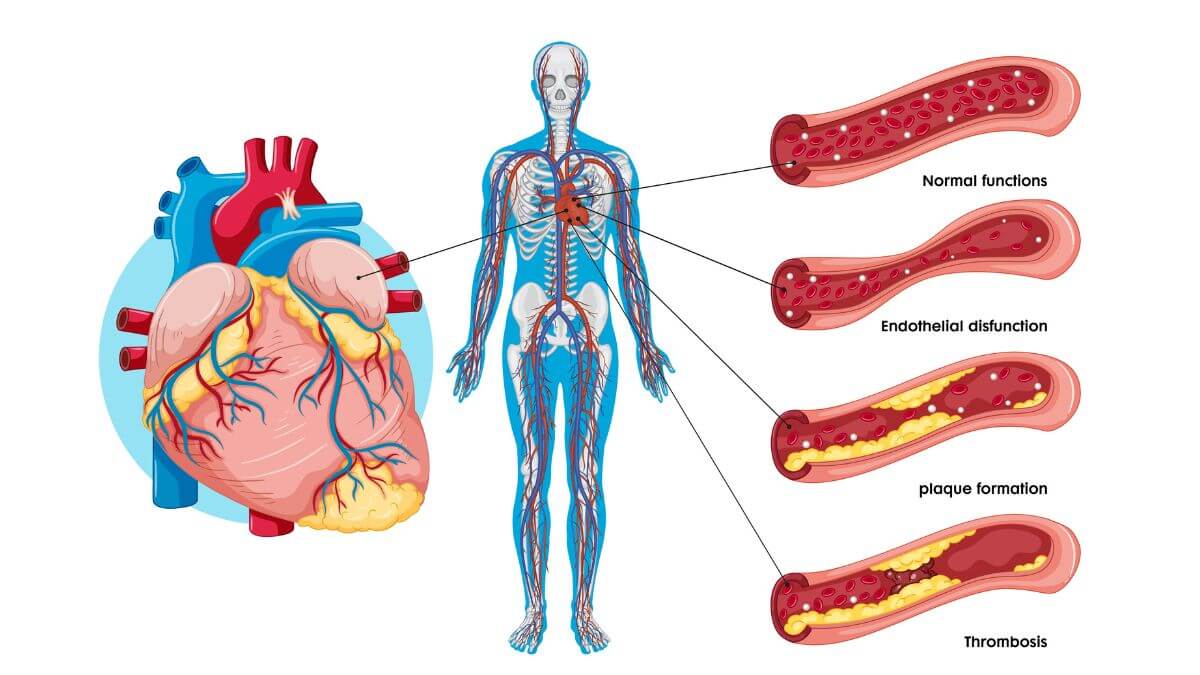Atherosclerosis is a chronic and progressive disease that affects millions of people worldwide. It is a condition in which plaque builds up inside the arteries, leading to the narrowing and hardening of the arteries. Atherosclerosis is a significant risk factor for coronary heart disease (CHD), a condition in which the arteries that supply blood to the heart become narrowed or blocked. In this article, we will discuss the link between atherosclerosis and coronary heart disease and the causes of atherosclerosis.
The relationship between atherosclerosis and coronary heart disease is that atherosclerosis is the primary underlying cause of CHD. The plaque buildup in the arteries narrows the space through which blood can flow, reducing the amount of oxygen and nutrients that can reach the heart muscle. This can lead to ischemia (reduced blood flow to the heart) and can cause chest pain, shortness of breath, and heart attacks. If the plaque ruptures, it can cause a blood clot to form, which can completely block the artery, leading to a heart attack.
The three main causes of atherosclerosis are high blood pressure, high cholesterol, and smoking. High blood pressure damages the lining of the arteries, making it easier for plaque to build up. High cholesterol leads to the buildup of fatty deposits in the arteries. Smoking damages the lining of the arteries and increases the risk of plaque buildup and blood clots. Other risk factors for atherosclerosis include diabetes, obesity, and a family history of the disease.
To reduce the risk of atherosclerosis and CHD, it is essential to adopt healthy lifestyle habits. These include maintaining a healthy diet, exercising regularly, quitting smoking, and managing blood pressure and cholesterol levels. Some medications, such as statins, can also help reduce cholesterol levels and lower the risk of atherosclerosis.
atherosclerosis and coronary heart disease are closely linked, with atherosclerosis being the primary underlying cause of CHD. By understanding the link between these conditions and taking steps to reduce the risk factors, we can protect our heart health and reduce the risk of complications such as heart attacks.
Natural Therapies for Atherosclerosis
While there is no known cure for atherosclerosis, adopting healthy lifestyle habits can help slow the progression of the disease and reduce the risk of complications. Here are some natural ways to help manage atherosclerosis:
Dietary Changes: Eating a healthy, balanced diet can help reduce the risk of atherosclerosis. A heart-healthy diet includes plenty of fruits and vegetables, whole grains, lean protein sources, and healthy fats such as those found in nuts, seeds, and olive oil. Avoiding processed foods, sugary beverages, and foods high in saturated and trans fats can also help reduce the risk of atherosclerosis.
Exercise: Regular physical activity can help improve cardiovascular health, reduce blood pressure, and lower cholesterol levels. Aim for at least 150 minutes of moderate-intensity aerobic activity per week, such as brisk walking, cycling, or swimming.
Stress Management: Chronic stress can contribute to the development and progression of atherosclerosis. Practicing relaxation techniques such as deep breathing, meditation, and yoga can help reduce stress and improve overall health.
Herbal Remedies: Some natural remedies, such as garlic, turmeric, and ginger, may have anti-inflammatory and cholesterol-lowering effects that could help manage atherosclerosis. However, it is essential to consult with a healthcare professional before taking any herbal remedies as they may interact with other medications.
Quit Smoking: Smoking is a significant risk factor for atherosclerosis and heart disease. Quitting smoking can help reduce the risk of complications and improve overall health.
It is important to note that while these natural remedies can help manage atherosclerosis, they should not be used as a substitute for medical treatment. It is essential to consult with a healthcare professional for proper evaluation and management of atherosclerosis. A combination of natural remedies, lifestyle changes, and medical treatment tailored to individual needs can help manage atherosclerosis and reduce the risk of complications.
